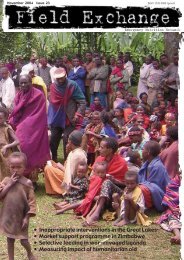Download a PDF of this issue - Field Exchange - Emergency ...
Download a PDF of this issue - Field Exchange - Emergency ...
Download a PDF of this issue - Field Exchange - Emergency ...
Create successful ePaper yourself
Turn your PDF publications into a flip-book with our unique Google optimized e-Paper software.
An Argentinean aid worker holds<br />
a girl injured in the earthquake<br />
in Leogane, Haiti<br />
UN, Haiti, 2010<br />
Research<br />
Voices from the field: Optimising<br />
performance for humanitarian workers<br />
By Jared Katz, Deborah Nguyen, Carla Lacerda and Gerald Daly<br />
The authors extend special thanks to Olesya Dudenkova for helping to get the project <strong>of</strong>f<br />
the ground, and to everyone who took the time to support <strong>this</strong> project along the way.<br />
Arecent study 1 set out to understand how<br />
humanitarian workers remain effective<br />
in challenging environments while also<br />
maintaining personal life balance.<br />
Discussions were held with twenty-six<br />
pr<strong>of</strong>essional humanitarians from eight international<br />
organisations currently working on the<br />
frontline <strong>of</strong> global emergencies. The interviews<br />
were framed on a McKinsey model <strong>of</strong> ‘Centred<br />
Leadership’, which identifies five capabilities<br />
that, in combination, generate high levels <strong>of</strong><br />
pr<strong>of</strong>essional performance and life satisfaction.<br />
They are finding meaning in work, converting<br />
emotions such as fear or stress into opportunity,<br />
leveraging connections and community, acting<br />
in the face <strong>of</strong> risk, and sustaining energy. The<br />
following is a compilation <strong>of</strong> the best personal<br />
practices <strong>of</strong> these 21st century humanitarians.<br />
Having meaning in work and life<br />
The humanitarians interviewed most <strong>of</strong>ten<br />
found meaning in the understanding <strong>of</strong> and<br />
connection with those receiving humanitarian<br />
aid. Humanitarians have a combination <strong>of</strong><br />
motives that may not be altogether altruistic, as<br />
the work can be financially motivating and the<br />
positions themselves bestow power and<br />
respect. However, those who find meaning in<br />
their work convey energy and enthusiasm<br />
because the goal is important to them personally,<br />
because they actively enjoy its pursuit, and<br />
because their work plays to their strengths. One<br />
humanitarian commented: “The ultimate goal<br />
must have meaning for humanitarians and the<br />
people they are serving; otherwise they’ll lack<br />
the energy and motivation to get things done.”<br />
‘Stay on target’ – Maintaining meaning<br />
Often, the noble motivations humanitarians<br />
may have had when entering <strong>this</strong> field become<br />
diluted, as they grow dependent on the money<br />
and benefits they receive from the work. Many<br />
interviewees stressed that staying out <strong>of</strong> the<br />
field to climb the bureaucratic ladder caused<br />
their work to become abstract and meaningless.<br />
Maintaining a sense <strong>of</strong> meaning throughout a<br />
humanitarian’s career can be aided by periodic<br />
visits to the field, and the connection with real<br />
on-the-ground <strong>issue</strong>s.<br />
When unable to get into the field, respondents<br />
found other methods <strong>of</strong> maintaining the<br />
connection. Some stayed in close contact with<br />
colleagues in the field to remember the meaning<br />
<strong>of</strong> their work. “It is important to talk to staff<br />
that work in the field, you will catch their<br />
enthusiasm.”<br />
‘Balancing act’ – Don’t neglect meaning<br />
outside <strong>of</strong> work<br />
Finding meaning in humanitarian work needs to<br />
be balanced with maintaining meaning outside<br />
<strong>of</strong> work. Maintaining personal relationships is<br />
<strong>of</strong>ten the best remedy against losing yourself<br />
and becoming over defined by your job.<br />
Balancing work and personal life is difficult.<br />
“It is a never ending challenge, and particularly<br />
so during an emergency situation where you<br />
are most likely to be separated from your<br />
family.”<br />
‘Rolling with the punches’ – Resilience and<br />
recovery<br />
Having a strong sense <strong>of</strong> meaning and a<br />
purpose greater than oneself fosters humility,<br />
which strengthens the ability to withstand and<br />
recover quickly from difficult situations.<br />
Emergencies cannot afford to have workers who<br />
are knocked <strong>of</strong>f balance by their own shortfalls,<br />
but who keep their “sights on target” and can<br />
adapt and react quickly to tough situations.<br />
Humanitarianism is not about you, but what<br />
you do: “You are not the centre <strong>of</strong> anything<br />
when you are a humanitarian. It’s about your<br />
work; it’s about achieving your objective.” By<br />
realising you are only a means to a greater end,<br />
you can limit frustrations and losses by not<br />
getting knocked <strong>of</strong>f balance with failures. You<br />
can recognise when you have made a mistake,<br />
“analyse your mistake and criticise yourself,<br />
but forgive yourself,” and move forward.<br />
Mental Framing: Converting emotions<br />
into opportunity<br />
Optimists have an edge over pessimists.<br />
Leaders who do not naturally see opportunity<br />
in change and uncertainty create stress and<br />
limit creative solutions. It is no surprise that<br />
75% <strong>of</strong> respondents believe they are optimists<br />
and use positive framing on a regular basis;<br />
they have found ways to convert stress into<br />
opportunity. “One <strong>of</strong> the reasons for my success<br />
is positive framing, I always see the bright side,<br />
I see the glass half full.”<br />
‘Making a purse out <strong>of</strong> a sow’s ear’ – value in<br />
positive framing<br />
Effective leaders grappling with failure see<br />
opportunity and creative solutions when others<br />
see defeat. Early on in emergencies, confusion is<br />
usual and decision-making is based on weak<br />
information, so projecting a positive and calm<br />
mindset supports team spirit. Leaders <strong>of</strong>ten<br />
project a positive frame because they know<br />
their team needs it.<br />
‘Teflon has its uses’ – Protecting yourself and<br />
your team<br />
Some people might choose deliberately to<br />
shelve emotions that are triggered by the<br />
intense suffering <strong>of</strong> people struck by a disaster.<br />
In doing so, they <strong>of</strong>ten are able to remain effective<br />
in the midst <strong>of</strong> the storm. The ‘Teflon<br />
method’ is such a shelving technique, allowing<br />
negative or intense situations to slide <strong>of</strong>f and<br />
not affect one’s work during a crisis. While the<br />
‘Teflon method’ can be effective in the shortterm,<br />
one respondent cautioned on the need to<br />
share with friends traumatic experiences as<br />
they occur. Their reasoning was that an<br />
unprocessed negative experience might<br />
ambush a humanitarian worker years after a<br />
traumatic event has been experienced.<br />
‘I’ve got high hopes’– A fine line Between optimism<br />
and naivety<br />
A common piece <strong>of</strong> advice was the importance<br />
<strong>of</strong> having realistic expectations <strong>of</strong> what can be<br />
accomplished. Humanitarian workers do not<br />
‘save the world’, but rather the best they can<br />
hope for is to help a disaster-impacted community<br />
or help with the formulation <strong>of</strong> a policy.<br />
Although there is nothing wrong with idealistic<br />
aspirations, it is important they are not<br />
confused with naivety, which can lead to disappointment<br />
or even depression.<br />
Leveraging connections and community<br />
‘Stay connected’ – Managing complex<br />
networks in emergencies<br />
Maintaining real-time updates in emergency<br />
situations by developing community and interorganisational<br />
networks can tremendously<br />
increase efficiency and help decision-making<br />
under conditions <strong>of</strong> uncertainty. “In order to<br />
stay connected you have to spend a lot <strong>of</strong> time<br />
in the field and understand the local context;<br />
what is on paper is not always what is really<br />
happening. Talk to donors, beneficiaries and<br />
other agencies to find out what needs to be<br />
worked on.” This approach provides updates<br />
on the politics, as well as other developments in<br />
fast-paced crisis environments. The role <strong>of</strong><br />
information technologies to achieve effective<br />
communication and decision-making goals in<br />
emergencies is a skill-set to be fully honed.<br />
‘Soak it in’ – Learning from others<br />
In a complex and high-pressure environment<br />
with little structured training, mentors provide<br />
an opportunity for young humanitarians both<br />
to learn from their experiences and provide<br />
inspiration to emulate their actions and make<br />
them more effective humanitarians. A shortfall<br />
in humanitarian mentoring system was<br />
summed up as: “Mentors don’t come easily,<br />
you have to make them happen.”<br />
Only one organisation, out <strong>of</strong> all those represented<br />
in <strong>this</strong> study, had a structured mentoring<br />
system.<br />
With little structured mentoring, it is important<br />
to learn as much as possible from everyone<br />
you come across. “At work you meet different<br />
people, some inspire you, and some have more<br />
experience. I try to absorb as much as I can on<br />
how they deal with different <strong>issue</strong>s: the way<br />
they manage a conflict between two colleagues,<br />
or how they listen to their team. I do not follow<br />
one model.”<br />
A unique angle <strong>of</strong> <strong>this</strong> <strong>issue</strong> is the new<br />
concept <strong>of</strong> reverse mentoring. Humanitarians<br />
who have been in the business a long time can<br />
have a narrowly defined skill-base and be ignorant<br />
<strong>of</strong> emerging humanitarian trends. Often it<br />
is younger colleagues who are most savvy in<br />
the newly emerging skill areas (e.g. social<br />
media in times <strong>of</strong> emergency). One respondent<br />
advised: “If older humanitarians wish to stay<br />
relevant and keep with the pulse <strong>of</strong> the 21st<br />
century needs, I suggest they ask to be reversementored<br />
by a younger colleague.”<br />
1<br />
Development in Practice, Vol. 22 Issue 2.<br />
13
















